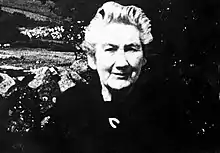Elizabeth Cronin
This page is about the singer. For the movie character, see Drop Dead Fred.
Elizabeth "Bess" Cronin (30 May 1879 - 22 May 1956) was an influential singer of Irish traditional music.[1]

Early life
Elizabeth Cronin, who was nicknamed ‘Bess’, and later ‘The Muskerry Queen of Song’ was born on 30 May 1879 in West Cork.[2] Cronin was the eldest daughter of Maighréad Ní Thuama and Seán ‘Máistir’ Ó hIarlaithe, who was a village headmaster in a school of Barr d’Ínse (which is why he is ‘Máistir), in the Fuithirí area of West Cork, near the Cork-Kerry border.[1] Cronin had five other siblings, four sisters: Mary Anne (b. 1882), Johanna (b. 1885), Nora (b. 1890) and Ellie (b. 1891), one brother: Tom (b. 1888) and two half-brothers: Dan and Tim who her father had in his first marriage.[2]
Cronin remained in the Baile Bhuirne area her whole life. She spent her teenage years on her uncle, Tomás Ó hIarfhlaithe (Tomás Bheirty) and his wife's (who was a sister of Cronin's mother) farm nearby. They were both childless.[2]
It was during these early years where she learned many songs and stories from her mother as well as on her uncle and aunt's farm, as many servants came and went for periods of five to six months. Cousins and friends would have also passed on songs to Cronin over the years. Due to Cronin's father being a teacher and her grandfather and uncle having a big interest in books, she was exposed to literature and the written word more than most would have been at the time.[2]
Cronin was a fluent native Irish speaker her whole life, as were her entire family. They were promotors of the Irish language.[3]
After she married her husband Seán Ó Croinin, she moved to Carraig an Adhmaid, Ballmakeery to ‘The Old Plantation’ which was known as the Cronin family farm.[1]
Family life
Cronin's father was a schoolmaster and her mother, being a professor of the Irish language, reinforced her strong education and connection with the Irish language.[2]
There is very little information on Cronin with regards to her family situation in her later life. Her grandson, Daibhi O Croinin, while having his primary occupation of being a professor of early mediaeval history, he also collected and compiled many of his grandmother's songs. Her sons, Donncha and Sean also both assisted in the physical recording of many of their mother's songs. It was in her own family too that she continued the galvanization of the use of Irish, even though many of her songs are recorded in English. Most of Cronin's songs are drawn from her experiences as a young teenager whilst she lived on her uncle's farm.[1]
Career and later life

Cronin made her first public appearance in 1899 which was in Feis in Macroom . When she made this public appearance she sang two songs that were in Irish. Cronin, who sang Irish traditional Music in Sean Nos, was described as a noted singer and also she was known as 'The Queen of Irish Song'.[2] Her career started from when she was a youth, she would sing at weddings, parties, or even when she was milking the cows. Cronin never received a recording contract from her career in Irish traditional music.[4] Cronin's Irish language caught interest from many collectors. Elizabeth hand wrote many of her songs as well as singing them in two languages which were Irish and English.[1]
A number of collectors recorded Cronin. Across the 1940s and 1950s, she was recorded by The Irish Folklore Commission, followed by Seamus Ennis twice and Marie Slocombe (both with the BBC), as well as the ethnomusicologist and folklorist Alan Lomax. Lomax included her songs in the Irish volume of his 18-volume “Columbia World Library of Folk and Primitive Music,” which he edited whilst in London during the 1950s.
From 1947 throughout to 1950 Cronin was contacted by many well known musical figures, such as Peter Kennedy, Jean Ritchie and George Pickow, Brian George, Diane Hamilton, and Robin Roberts. Cronin produced over eighty songs on tape, however, many of her songs are not available to the public. Daithi O'Cronin, her grandson, has contributed a book to her including 200 songs that belong to her.[4] Cronin kept many songs in her private collection, never to be released publicly.[1]
Towards the latter-end of Cronin's life, her music was grouped together into a collection called “The Commercial Recordings”.
Suggested through the listening of several recorded collections, including “The Bonny Blue-Eyed Lassie” recorded by Diane Hamilton in 1955, it is evident that she has become exhausted and struggles to sing.[2]
Cronin fell ill to blood related diseases toxaemia and anaemia, and she died on 22 May 1956 at the age of 76.
Legacy
Cronin created some records during her life which are still to this day widely available in the Irish traditional music archive. Most of her songs covered the topics of home and family, including "The Little Pack of Tailors", "Pussy Cats Party", "The Good Ship Kangaroo" and "Uncle rat".
The tune and the lyrics of her version of Siúil a Rún were the foundation of many subsequent recordings, including those of Clannad and Celtic Women. Cronin also influenced Irish singers such as Christy Moore and Martin Carthy and Seamus Ennis. Her songs are still played on RTE radio.
Half of Cronin's songs were written in Irish, it was these song which caught the attention of the first collectors who visited her. Her continued use of the local Irish dialect throughout her records, made many in her community proud to be associated with it.[1] Séamus Ennis referred to Cronin as the “Muskerry Queen of Song,”.[1]
There is a version of "Lord Gregory" (The Lass of Roch Royall) by Cronin on the Cultural Equity website.[5][6]
References
- The Irish Times (19 December 2000). "The Muskerry Queen of Song". The Irish Times. The Irish Times. Retrieved 23 November 2018.
- Ó Cróinín, Dáibhí (2000). The Songs of Elizabeth Cronin, Irish Traditional Singer. Dublin: Four Courts Press.
- Russell, Ian (2003). "Reviewed work: The Songs of Elizabeth Cronin, Irish Traditional Singer". Folk Music Journal. 8 (3): 372–374. JSTOR 4522696.
- Brennan, Christopher (2016). "Biographies of Famous Singers". Comhaltas Rochester Irish Music Association. Christopher Brennan. Retrieved 23 November 2018.
- "Lord Gregory". Cultural Equity. Retrieved 14 February 2018.
- "Lord Gregory (conclusion)". Cultural Equity. Retrieved 14 February 2018.